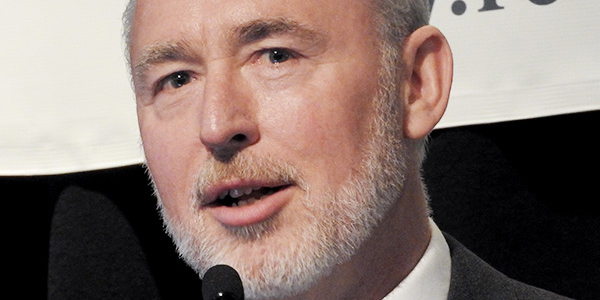By Michael Kuser
ISO-NE CEO Gordon van Welie said Thursday that implementing a carbon price in New England’s wholesale power markets would be “simple” but that state officials need to signal their support before the RTO can act.
Van Welie made his comments in his response to a Feb. 19 letter from U.S. Sens. Ed Markey (D-Mass.), Bernie Sanders (I-Vt.) and Sheldon Whitehouse (D-R.I.) expressing concern that the RTO “is pursuing certain changes to the energy market at the expense of the region’s environmental goals and related clean energy and energy efficiency policies.”
“If ISO-NE believes that the region’s clean energy goals can be addressed by integration of a carbon price into the energy market, what is stopping ISO-NE from studying this as a potential policy pathway and ensuring that New England stakeholders have accurate background on these policies?” the senators asked.
They noted the October report commissioned by NYISO Study: Carbon Charge to Help NY Climate Goals.)
“ISO-NE should commission a similar report … and take a larger leadership role in engaging more proactively in policy development,” they wrote.
Van Welie said that while the RTO supports carbon pricing, “we are mindful of concerns raised by the New England states regarding a carbon price in the wholesale markets, including limitations on the states’ ability to influence a federally regulated carbon price. We take these concerns seriously and appreciate the relationships we have developed with the states and the New England Power Pool stakeholders over the last several decades. Therefore, any effort to study carbon pricing requires further discussion in the regional stakeholder process — a process that is improved with input (like this exchange) from members of the region’s congressional delegation.”
Van Welie said “pricing carbon could be implemented by state or federal policy including through the existing Regional Greenhouse Gas Initiative structure.”
But while Massachusetts and Connecticut have pursued ambitious environmental policies, including contracting for offshore wind, other New England states have been reluctant to reduce RGGI’s emission limits enough to make state-subsidized resources economic in the RTO markets. “What I want is not to pay for Massachusetts’ and Connecticut’s policies,” New Hampshire Public Utilities Commissioner Robert Scott told a ISO-NE Two-Tier Auction Proposal Gets FERC Airing.)
Van Welie quoted from his November response to a similar missive from seven U.S. senators from New England, saying that pricing carbon through regional wholesale markets “is a simple and easily implemented mechanism for reducing (or eliminating) carbon and sparking a clean energy transition.”
The seven senators had urged ISO-NE to “return to the table with stakeholders” and more closely align its fuel security initiative with state policies seeking to speed the transition to renewable energy resources. (See Senators Ask ISO-NE to Heed States on Clean Energy.)
The senators criticized ISO-NE for “pursuing a patchwork of market reforms aimed at preserving the status quo of a fossil fuel-centered resource mix” and having “charted its own path forward and pursued unpopular initiatives” such as Competitive Auctions with Sponsored Policy Resources and the Inventoried Energy Program.
In last week’s response, van Welie insisted ISO-NE has long supported carbon pricing.
“The relative ease of implementation is particularly attractive when compared to some of the more detailed market changes we have made in the past (and that may be required in the future) to protect market efficiencies as states take actions outside the wholesale market to meet their policy goals,” van Welie said.




